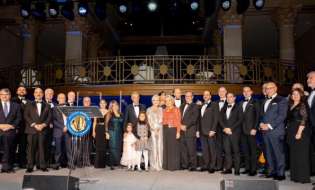Υπογεννητικότητα: Συμβιβασμός ή Επιλογή
«2.000 ευρώ καθαρά έσοδα στο σπίτι. 600 ευρώ ενοίκιο. 400 ευρώ σούπερ μάρκετ. 400 ευρώ παιδικός σταθμός. 300 ευρώ ΔΕΗ, νερό, τηλέφωνα, κοινόχρηστα.…


Νέα Υόρκη, ΝΥ — Το Ελληνοαμερικανικό Εμπορικό Επιμελητήριο( HACC) διοργάνωσε με ιδιαίτερη επιτυχία την 73ο Ετήσια εκδήλωση (gala) τιμώντας το «Πρόσωπο της Χρονιάς» και συγκεντρώνοντας εξέχοντες ηγέτες από τον χώρο...

Πάνω από 800 Ελληνοαμερικανοί από όλες τις…

Με αντιπροσωπεία της AHEPA συναντήθηκε σήμερα ο…

Οι Έλληνες της Μαριούπολης, δήλωσε ο Γιάννης…




Philosophy professor and writer Christos Giannaras passed away at the age of 89.
The news of his death was announced by his son Spyros, via Facebook.
Who was Christos Giannaras?
Christos Giannaras was born on April 10, 1935. He studied theology at the University of Athens and philosophy at the University of Bonn and Paris (Sorbonne).
He was a Doctor of Philosophy from the Faculty of Humanities of the Sorbonne University and the Faculty of Theology of the Aristotle University of Thessaloniki. He was also an honorary doctor of the University of Belgrade, St. Vladimir's Orthodox Seminary in New York, the National and Kapodistrian University of Athens and the School of the Holy Cross in Boston. He was the director of Synoro magazine, which published twelve issues from 1964 to 1967.
From 1982 to 2002 he was a full professor of philosophy at the Panteion University of Political and Social Sciences in Athens, initially in the then unified Department of Political Science and International Studies and then in the Department of International and European Studies. He taught philosophical terminology and method, political philosophy and cultural diplomacy. He has also taught as a visiting professor at the universities of Paris, Geneva, Lausanne and Crete.
Christos Giannaras had demonstrated a rich literary work with themes related to the research of the differences between Greek and Western European philosophy and orthodox Christian tradition. His book "The Freedom of Morals" is considered to have defined the core of what was later called "neo-orthodoxy" and has been labeled "the May of '68 in Orthodox theology and ethics". Many of his works have been translated into at least 10 European languages.
He was a scholar of the German Scholarship Foundation "Alexander von Humboldt Stiftung", he was an elected member of the Society of Greek Writers, as well as of the International Academy of Humanities (Brussels). He intervened for many years in the social and political current affairs through regular articles in the newspapers "To Vima" and "Kathimerini", with parallel television appearances.